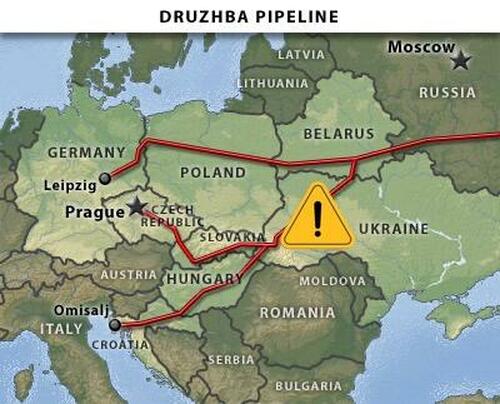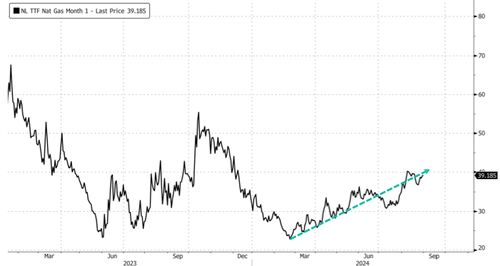
Ukrainian media has reported that starting January 2025, the transit of Russian oil through the Druzhba pipeline in the Eastern European country will be halted, along with the transit of natural gas. This is yet more geopolitical risk premium for European energy markets ahead of the Northern Hemisphere heating season.
Ukrainska Pravda cited an interview with Mykhailo Podoliak, an advisor to President Volodymyr Zelenskyy, and the Ukrainian media outlet Novyny. Podoliak said, "In addition to gas, the Druzhba pipeline will also cease operations starting 1 January 2025."
BREAKING:
— GAMZIRI24 (@GAMZIRI24) August 30, 2024
Ukrainian President's Office announces cessation of oil supplies through "Druzhba" pipeline from Russia, impacting Slovakia, Czechia, and Hungary.
Ukrainian gas transit from Russia to stop in January 2025. pic.twitter.com/KxVVEODfPS
Podoliak pointed out that countries like Slovakia, Czechia, and Hungary have received Russian oil through the Druzhba pipeline for years.
The European Union has forced member countries to diversify their energy supplies and end the transit of Russian crude and NatGas through Ukraine.
Podoliak also mentioned that this applies to NatGas, with specific contracted volumes set to expire on January 1, 2025. However, he noted that Ukraine can facilitate the transit of fuels if European countries require Kazakh or Azerbaijani NatGas.
Responding to a Reuters question on Podoliak's comments, Czech energy security czar Vaclav Bartuska said, "This is not the first time. This time maybe they mean it seriously—we shall see," adding, "For the Czech Republic, it is not a problem."
FACE founder and geopolitical strategist Velina Tchakarova wrote on X that this development indicates "more geopolitical risk premium for Europe was added ahead of the third winter on both fronts—oil and gas. The EU still remains the largest buyer of Russian fossil fuels since the beginning of the Russian war against Ukraine, followed by China and India."
More geopolitical risk premium for Europe was added ahead of the 3rd winter on both fronts - oil & gas. The EU still remains the largest buyer of Russian fossil fuels since the beginning of the Russian war against Ukraine followed by China and India. @anasalhajji @Attaqa2 #Velsig https://t.co/vbsh76zbaU
— Velina Tchakarova (@vtchakarova) August 30, 2024
This move by Ukraine appears to be a much broader effort by the West in the attempt to weaken the Russian economy by ensuring hydrocarbon flows, the primary source of Moscow's war funding, are halted by any means necessary. Ukraine has been chipping away at Russia's energy complex, bombing refineries and storage facilities with kamikaze drones this year.
In markets, Dutch TTF NatGas futures, the benchmark for Europe's gas trading, have been moving higher since mid-February, now trading near 40 euros per megawatt-hour.
Despite the ongoing risks to energy markets across the EU ahead of winter, storage levels are at elevated levels.
Ukrainian media has reported that starting January 2025, the transit of Russian oil through the Druzhba pipeline in the Eastern European country will be halted, along with the transit of natural gas. This is yet more geopolitical risk premium for European energy markets ahead of the Northern Hemisphere heating season.
Ukrainska Pravda cited an interview with Mykhailo Podoliak, an advisor to President Volodymyr Zelenskyy, and the Ukrainian media outlet Novyny. Podoliak said, “In addition to gas, the Druzhba pipeline will also cease operations starting 1 January 2025.”
BREAKING:
Ukrainian President’s Office announces cessation of oil supplies through “Druzhba” pipeline from Russia, impacting Slovakia, Czechia, and Hungary.
Ukrainian gas transit from Russia to stop in January 2025. pic.twitter.com/KxVVEODfPS
— GAMZIRI24 (@GAMZIRI24) August 30, 2024
Podoliak pointed out that countries like Slovakia, Czechia, and Hungary have received Russian oil through the Druzhba pipeline for years.
The European Union has forced member countries to diversify their energy supplies and end the transit of Russian crude and NatGas through Ukraine.
Podoliak also mentioned that this applies to NatGas, with specific contracted volumes set to expire on January 1, 2025. However, he noted that Ukraine can facilitate the transit of fuels if European countries require Kazakh or Azerbaijani NatGas.
Responding to a Reuters question on Podoliak’s comments, Czech energy security czar Vaclav Bartuska said, “This is not the first time. This time maybe they mean it seriously—we shall see,” adding, “For the Czech Republic, it is not a problem.”
FACE founder and geopolitical strategist Velina Tchakarova wrote on X that this development indicates “more geopolitical risk premium for Europe was added ahead of the third winter on both fronts—oil and gas. The EU still remains the largest buyer of Russian fossil fuels since the beginning of the Russian war against Ukraine, followed by China and India.”
More geopolitical risk premium for Europe was added ahead of the 3rd winter on both fronts – oil & gas. The EU still remains the largest buyer of Russian fossil fuels since the beginning of the Russian war against Ukraine followed by China and India. @anasalhajji @Attaqa2 #Velsig https://t.co/vbsh76zbaU
— Velina Tchakarova (@vtchakarova) August 30, 2024
This move by Ukraine appears to be a much broader effort by the West in the attempt to weaken the Russian economy by ensuring hydrocarbon flows, the primary source of Moscow’s war funding, are halted by any means necessary. Ukraine has been chipping away at Russia’s energy complex, bombing refineries and storage facilities with kamikaze drones this year.
In markets, Dutch TTF NatGas futures, the benchmark for Europe’s gas trading, have been moving higher since mid-February, now trading near 40 euros per megawatt-hour.
Despite the ongoing risks to energy markets across the EU ahead of winter, storage levels are at elevated levels.
Loading…





